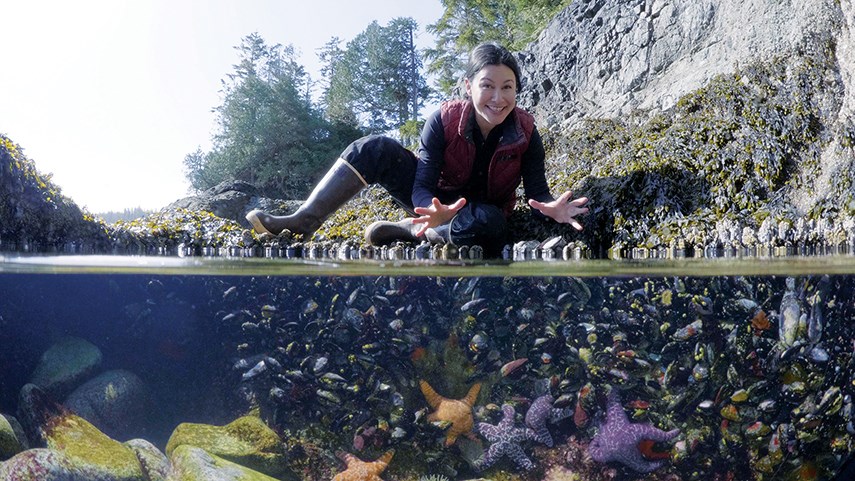Who knew starfish were so strong? Or that barnacles are the most – ahem – well-endowed creatures around? If you’re like most West Coasters (guilty), there’s a lot that you don’t know about the richness and diversity of our own shoreline.
“On the West Coast we do get to experience a lot of nature but we tend to focus on the bigger creatures – the whales, wolves, the eagles – and we forget that the tiny creatures are just as fascinating,” says Sarika Cullis-Suzuki, host of Kingdom of the Tide, which airs on Friday, Feb. 7 and streams on CBC Gem.��
In the documentary Cullis-Suzuki journeys from the intertidal pools of the Gulf Islands, where she spent summers as a child, to the Bay of Fundy on the East Coast, which boasts the highest tides in the world (13 to 15 metres). Once the tide goes out it exposes up to five kilometres of exposed mud, a rich habitat for tiny mud shrimp. “I met with field ecologist Diana Hamilton there and we were literally skating on mud . . . I didn’t even know you could do that!”
Along the journey we learn that limpets’ teeth are made of the strongest biological material on Earth, that colonies of lovely looking anemones actively poison their rivals, and that seaweed in the Bay of Fundy clings to rocks despite being battered by the equivalent of 1,000 km/h winds every 10 seconds, with each roll of the tide.
Nature shows in general have been revolutionized by advances in technology: drones are able to capture living creatures such as pods or Orca or herds of caribou from a respectful distance, while high-def cameras allow filmmakers to get up-close-and-personal with microscopic subjects. It opens up a whole new world for those of us unaware what’s underfoot when we go for a paddle. “Jacques Cousteau said ‘we protect what we love,’” says Cullis-Suzuki. “So the first step is to make people fall in love with the world around them. Then we need to roll up our sleeves and do something about it.”��
Cullis-Suzuki is the daughter of renowned geneticist-broadcaster-environmentalist David Suzuki and activist Tara Cullis. She was born and raised in Vancouver but spent every summer at the family cabin on Quadra Island. Dad David’s first job was in carpentry (“a lot of people don’t know that”) so “he would be hammering away while my sister and I would be out playing and fishing.” She fell in love with the creatures living in the water, she says, and had already decided to be a marine biologist by age six.
Cullis-Suzuki revisits that same cove in the show: “That was really evocative, returning as an adult and as a scientist.” The cabin is still there, too; it’s been added on to over the years but she admits, “It’s still pretty tight in there when we all get together!”
She got her undergraduate degree in marine biology from Cal Berkeley, her masters in fisheries science from UBC, and her PhD after studying the effects of boat noise on fish, “the anthropogenic forces and how we’re impacting animals.” She’s had her share of the spotlight, too: she was named one of Canada’s top 30 under 30 by Explore Magazine, an “influential Canadian Millennial” by Huffington Post Canada, and she was Ms. Chatelaine in 2015. “The truth is, media is vulgar, and not necessarily thorough because it has to go out quickly,” she says. “Science is the opposite: it’s something that takes a lot of time and can’t be subjective. I personally really love being able to dip my toe in both worlds: neither are perfect but both are necessary.”
These days her focus is on education and marine conservation through media. “There is some urgency to what’s going on in the planet right now, so I’m enjoying getting the message out there whenever I can.”
Does she see herself taking over from her father? “I could never be David Suzuki,” she says of her dad, now 83. “Nobody can do what he does. He’s a super human.” Cullis-Suzuki learned that in a special way after the first time they worked together on a project a decade ago. “Growing up he spent a lot of time away from us kids and I wondered what he was doing.”�� But during the shoot, she says, he got up at 5 a.m., spent long days shooting and he never complained: a consummate professional. “It was really inspiring. I feel very fortunate to be part of what he created.”
��Cullis-Suzuki now lives in Victoria with her husband, five-year-old and twin two-year-olds. “Sometimes I do interviews in the shed because it’s too noisy in the house!” she confesses. (That twin gene, incidentally, is something else she got from her dad: Suzuki was also a twin.) And it looks like the family legacy of environmental activism is off to a promising start: Cullis-Suzuki asked her five-year-old what he wanted to be when he grew up. “He said ‘I want to study fish in the ocean,’” she laughs, “it was my proudest moment.”
��




